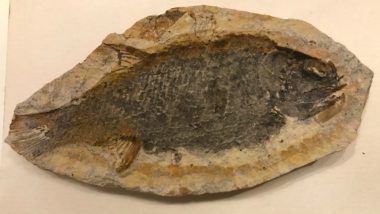Toronto, February 2: Paleontologists have discovered a never-before-seen species of fish in Colombia, with the help of a ten-year-old curious tourist. The fossil, Candelarhynchus padillai, is about 90 million years old and has no modern relatives, said Oksana Vernygorafrom the University of Alberta in Canada.
"A kid was walking into the Monastery of La Candelaria during a tour when he noticed the shape of a fish in a flagstone on the ground," said Javier Luque, co-author of the study published in the Journal of Systematic Palaeontology.
"He took a photo and, a few days later, showed it to the staff at the Centro de Investigaciones Paleontologicas, a local museum with whom we collaborate to protect and study fossil findings from the region," said Luque. The staff at the centre recognised the image as a fossil fish right away, researchers said.
Alison Murray, a professor at the University of Alberta, joined her colleagues in the South American country to retrace the steps of the young tourist, who was 10 years old at the time, near the town of Raquira Boyaca. The team found a nearly perfect, intact fossil of an ancient fish. It was the first fossil "lizard fish" from the Cretaceous period ever found in Colombia and tropical South America, researchers said.
"It is rare to find such a complete fossil of a fish from this moment in the Cretaceous period. Deepwater fish are difficult to recover, as well as those from environments with fast-flowing waters," said Vernygora. "But what surprises me the most is that, after two years of being on a walkway, it was still intact. It is amazing," said Vernygora. The discovery contributes to the growing and important body of literature on the fossil record in the tropics.













 Quickly
Quickly





















